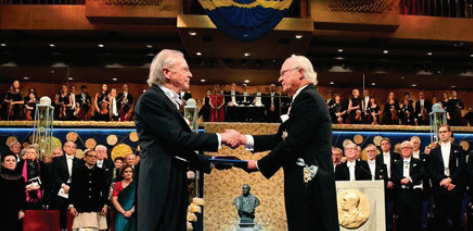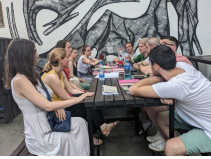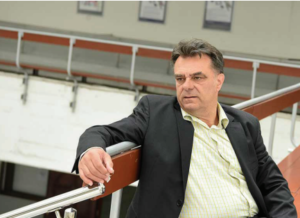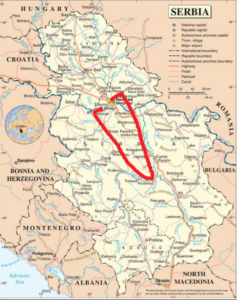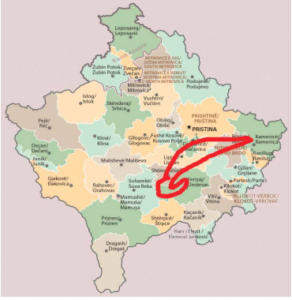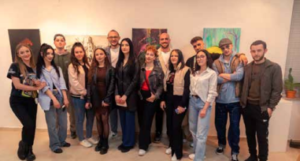Amila Kahrović Posavljak was born in Sarajevo, 1984. She survived three and a half years of siege as a child and it made a huge impact on her work. She graduated at the Faculty of Philosophy in Sarajevo and got a degree Master of sciences in literature history.
She worked as a political journalist but then left journalist engagement in order to start writing literature. She published poetry book Koščice (Little Bones) in 2016, and got a prestigious regional Mak Dizdar award. Her first novel Smrtova djeca (Deaths children)
was published in 2017, got award Excellence in Literature (USA) and is now being translated into English. She also wrote papers in literary theory and interpretations in publications indexed in approved scientific basis. Amila Kahrović Posavljak lives and works in Sarajevo.
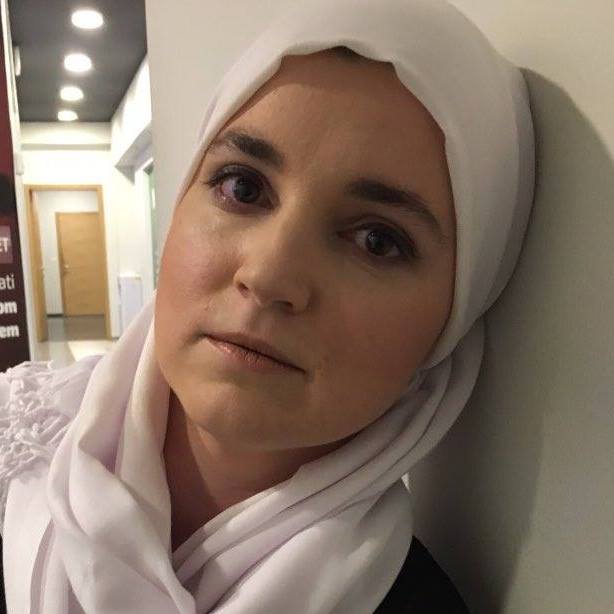
By Amila Kahrović Posavljak
Delivering Nobel Prize to Peter Handke sparked a lot of controversies. The decision itself raised some questions that seemed to be forgotten in contemporary Europe and what is severely known as Western world. Again, it opened a field of questioning relations between literature canon and politics, aesthetics and genocide denial. What is good literature and who will determine what good literature is?
The specificity of genocide denial
Handke has been rewarded for his writings and ”for an influential work that with linguistic ingenuity has explored the periphery and the specificity of human experiences”. In defending its shameful decision Handke’s opinion mates announced that he is rewarded only for his literature. Really? So, what is beautiful in Handke’s literature or what are periphery and the specificity of human experience? Even writers who reacted stated that Handke wrote some good literature and then, all of a sudden, turned into the devil. Well, if Handke’s literature has been seriously read, than one fact becomes clear. His literature got a horrible climax in defending a genocide ideology. Even before that phase, Handke’s writing was turning sort of pop-literature framed in a false anti-establishment attitude. Why false? For a very simple fact.
In the early ’90s, Handke took a stand with performers and ideologists of the first genocide in Europe after World War II. Why? It was a cheap sort of anti-establishment, anti-Western and anti-imperial attitude.
So, what is ”exploring periphery and the specificity of human experiences” in standing against Western centers of power by adoring the Balkan’s butcher Slobodan Milošević who left few hundreds of thousands of dead civilians after him? Let’s face the facts. It is not an anti-imperial attitude to stand with the genocide ideologists and performers and later deny genocide. It rather takes the side of one establishment against the other, in this case taking the side of a genocide establishment against the Western one. That is the point where a lot of anti-establishment stars prove themselves to be pure conformists.
Awarding Handke is awarding the ideology it follows. If it is argued that he got the reward for his opus rather than one book that is even more wrong. His opus contains some good (and good is not an excellent) literature from his early phases. And there is also some not so good literature. In the second phase, his writings became a cheap pamphlet. That sort of Handke’s ”literature” is especially obvious in his writings after traveling the entity Republic of Srpska and taking pictures on sites of genocide, Srebrenica and Vishegrad in a time when international investigators were searching for mass graves with almost nine thousand killed Srebrenica Muslim boys and men. And his attitude has not stopped there. He denied genocide, approved its results and moved on with dehumanizing victims such as Mothers of Srebrenica. Instead of engaging literature, he offered us Great Serbia advocacy and genocide denial activism. Is that ”periphery” Swedish Academia admires so much? And after all, a writer whose literature can be divided into phases of pre and after adoring Milošević is simply a failure.
So, where is aesthetics in Handke’s literature? And how it is actually possible to differentiate the writer from his writings? It seems that the old and simple mantra of the differentiation of the writer from his work is used to make ”controversial” writers acceptable. Of course, the word ”controversy” in cases such as Handke’s is simply a euphemism for ideas close to fascist ideologies and genocide denial. Insisting on the difference between a writer and his work is simply making pro-fascist literature acceptable or understanding the text as a result of certain extra-writer inspiration, some sort of epiphany.
Aesthetics of genocide denial
So, imagine a writer’s day in 1996 while writing about his travels. He takes a bath in the river Drina in Vishegrad and takes a picture, a river known as the biggest mass grave in Europe (Milan Lukić and his group of Serbian soldiers are convicted for rapes and mass killings of Bosniaks, Muslims in Vishegrad and throwing victims in the Drina river after sadistic torture). There was also the Vilina Vlas hotel, that has previously been used as a rape camp for Bosniak women and girls some aged only 12, the hotel still not clean from traces of rape, torture, and killings. After a bath and drink the anti-establishment writer makes notes and stories about a tremendous travel, supporting the genocide ideology and exploring ”the periphery”. Since the literature has been for a long time (and someone should get Swedish academia to know it) understood as an ideological discourse in some ways, where is the point of making the difference between an author and his writings? What periphery do you choose to admire? The one of the victims, or that of war criminals? There are more questions to ask. How do you put this sort of essentializing and ideology-free aesthetics in what is called the post-truth era? Or is the post-truth era actually selected-truth era where Handke’s ”truth” is more important than the actual truth of genocide victims and after all International Criminal Tribunal for the former Yugoslavia? That sort of selection could very easily be the dead-end of a modern European and Western culture.
Canonizing war criminal’s apologists
Not simply for a rewarding writer such as Handke. But also for bringing to life the ideology of Slobodan Milošević and Great Serbia that has led to massive ethnic cleansings in the Balkans and genocide in Bosnia and Herzegovina. In that manner, Handke just keeps the rhythm of the former European establishment (isn’t it strange for an ”anti-establishment” writer). The real anti-establishment attitude was present with a lot of brave journalists and artists who were warning the European leaders where their neutrality towards ethnic cleansing and genocide will lead to. That European establishment first didn’t want to stop Milošević, then failed to prosecute him and after all gave his apologist the greatest literary award that will guarantee his place in literature and academy canon. As a part of the canon, Handke will be able to speak his ”alternative truth” in which nine thousand men and boys murdered in Srebrenica genocide are simply a conspiracy against innocent Slobodan Milošević, the guy from the ”periphery” that the Swedish academia likes so much. That last phase comes at a time of massive genocide denial and making strong efforts to make ”all sides equal” in the 90’s war although just one of them performed genocide. Rewarding Handke is, therefore, a final point of historical revisionism. And that could be the long term problem for Europe because there is no small or big genocide. Each genocide is based on the idea that some people should be killed and removed simply for their identity. All genocide celebration and denial are rooted in the same idea: revitalizing fascist ideologies in a normalized way and putting them into the mainstream. And who actually has the right to do that, even in the name of exploring ”periphery” by admiring people such as Slobodan Milošević and Milan Lukić?
So, the question for Academia: who gave you the mandate to include in the global canon something full of cheap pamphlets and genocide denial? Do you know that a genocide denial is a criminal act? What actually makes the difference between Handke and Neo-Nazis? He proved to be verbally aggressive towards families of genocide victims and journalists. If anyone else has done such a thing, he or she would lose everything, his/her career would be ruined and he/she would face criminal charges. Unless he does that against ”less important” victims in the name of ”periphery” exploring.
And regarding the periphery exploring, have you ever heard of Karim Zaimović? He was an amazing and unimaginable, innovative Bosnian writer. He was killed during the Sarajevo siege in 1995, only 23 years old. In spite of such a short and life ended in tragic, he wrote some amazing literature and an amazing book, The Secret of Raspberry jam. You should read it. That is innovative and resistant literature. Karim was killed by Serbian soldiers in Sarajevo under the siege. He was killed by soldiers your new laureate is celebrating and pledging that their fight was a matter of justice, in the name of exploring the ”periphery” and people’s experience. That ”periphery” committed and approved genocide.
While you were celebrating Handke’s literature, people were protesting. Mostly families of the victims. Some of them have never found the bones of their loved ones. You ignored them. See, there are different types of what you call ‘’periphery’’. The one you take stand for – that is your ethical and intellectual ID.

